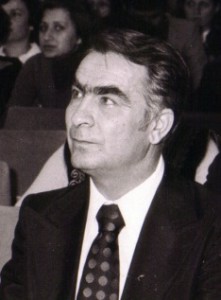This post is also available in: Macedonian French Serbian Croatian Bosnian
I remain committed to Macedonia
Excerpts from the Aco Šopov‘s interview with Ivan Krtalić, published in Око, Zagreb, 2-16 December 1976
- There are poets who come from culture and poets who come from life. I think that Macedonian poets all come from life. This is probably why there are no poets in Macedonia who are in vogue for a while and who are forgotten as soon as new ways of saying or new literary trends appear.
- Every poet sees the world, and the man in this world – including himself – from a particular angle. He has his own inimitable apparatus for self-expression, which only he, as a poet, masters and which only he knows how to use.
- I know, the excessive use of metaphor is not common in modern poetry. But the questioning of human existence forces us to discover new meanings of words, new contents, new associations, new relationships. And that is my weapon. Every poet has his own universe of symbols, and even if they are recurrent, their relevance depends on the context, on the new content in which they are placed. Tout dépend du poète qui construit le poème. Pour moi, la démarche n’est pas importante. The process, the handwriting, the technique are not what determines the quality of a poet. The poem is the one. In my case, it has been said, for example, that I have abolished the narrative in poetry, that I have reduced the number of words to a minimum. Seen from the outside, one can believe that it is a question of method, a conscious and deliberate approach. But as far as I’m concerned, I only use as many words as necessary to express myself. From its first to its last version, the poem undergoes several modifications. I work on the poem, I replace one word with another, I look for new expressions, to better say what I want to say. This is the result of self-dissatisfaction, this is part of the poet’s work, nothing more.
- [About The Black Woman’s Song, a collection inspired by the poet’s stay in Senegal] New life conditions do not create a new poet. The poet remains the same. I am the same. And I remain attached by visible and invisible ties to Macedonia, to its people and language, to its destiny.

